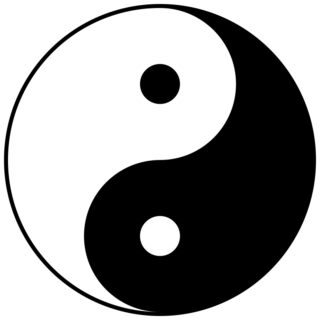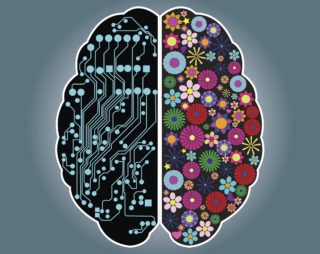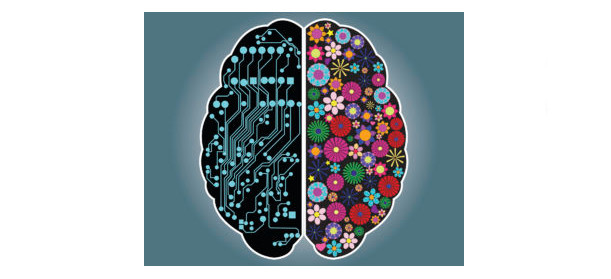Plosm’s division of Logos and Ouroboros does map onto other dualistic theories of nature, such as the left brain vs. right brain conceptualisation of thinking styles, or feminine yin vs. masculine yang, or the philosophical mind vs body problem etc.

The development that Plosm adds to this division is the focus on the Path. This path is the line where the two worlds meet, like a seam, and our life is the passage along this path, creating the world. We the travellers are conceptualised as the Scientist and the Muse, experts in the way of Logos and Ouroboros, respectively.
The actualisation of the Scientist and the Muse is reached by travelling along the path, but they tend to work against each other, and this is the source of tension. The resolution of the tension is found by balancing the tendencies of the two. This balance is how we create peace, the perfect platform for both Science and Muse to flourish.
Conceptually, this balance can apply to anything so Plosm is relevant to our individual lives, but also to the activity of humanity as a whole. Societies flourish when the sciences are balanced with the arts.
It is sometimes easier to talk about what each extreme looks like rather than attempt to define balance. A society that is only rational in its operation has no place for error, for wasteful play, for music and drunkennes or for gods. On the other hand, a society that is supremely ruled by gods (or muses) is fundamentally irrational, with no room for constructive dissent, pushing away reality in favour of worship, sacrifices, or in pursuit of selfishness.
In one’s own life, at every moment we face questions of how to act, and as time goes on the pattern of our decisions creates our reality. Acting rationally all the time creates a secure structure to life, but one that is built around a specific reality, or set of priorities, and when that reality changes it loses its meaning. Acting irrationally leads to a life charged with meaningfulness but lacking stability and security. We are forced in the end to draw on both kinds of behaviour to build a life.
When things go wrong it may be the result of our own imbalanced decisions, or those of the society we live within.
Theocratic societies punish scientists and ‘unbelievers’. Societies that disavow the muses are supremely boring and static. Actually, in reality I don’t think any society can completely repress the other half of nature, but it is forced to exist in the cracks, in the details.
Plosm is about accommodating both sides equally.. not exactly equally, because it changes from day to day, century to century, but the point is about balance and acceptance of the validity of the both sides.
Both sides must make some concessions to the other. For instance, religions can continue to exist, but they must accept that their god is not the only god, but one among many. Apart from that, they can continue as before.
(It is also conceptually possible to say that all religions in some way or other are devoted to the same god, the essence of ouroboros itself, and this is true in a way, but since religions make efforts to differentiate themselves, we can take their gods at face value.)
Alongside all the churches there are other towers of song which have their own perspective and these can be accommodated too, as long as they recognise each other as equally valid paths.
To accommodate the study of reality that is the work of the sciences, Plosm only requires that those schools which work with language and reason accept that there is some thing that cannot ever be grasped by these tools. Its impossible to say what that is though, because labelling it is a kind of grasping, and although you might catch a bit of it with a label for a while, you can never catch it all.
The actualisation of science, is the attainment of knowledge. For this to occur, the conditions for science must exist and these include a stable society, and healthy contented population. Science is humanist. It is simply rational.
I think a rational approach sees the continuation of humanity and the advancement of science and technology in the same terms. All humanity is included – its diversity is a strength, like any ecosystem. It is also a part of the larger ecosystem of the planet so caring for that goes hand in hand with caring for humanity.
Science sees human life as finite and works to extend it. It reaches for the stars. Contact with another civilisation will be a great moment for science as that will give it access to all that knowledge.. it will be great for the muses too.
But muses are seeking contact in a different way, they plunge inward, into themselves and the souls of others and into devotion and other life and spirit, seeking answers that way. They might follow one of the churches. they might be alone. There are no rules, or systems, or rather, there are as many rules and systems as there are followers. All can work. But to there is no universal system like there is for science, if there was, it would just be another part of science.
Even Plosm as it appears here is kind of a scientific approach, attempting to logically describe these things. But it fails ultimately on these terms because when it comes to the path of the Muses, really there is nothing that can be said about it except that it is there. So Plosm must be lived, not explained.
